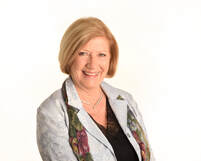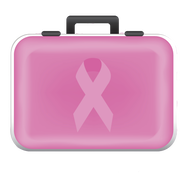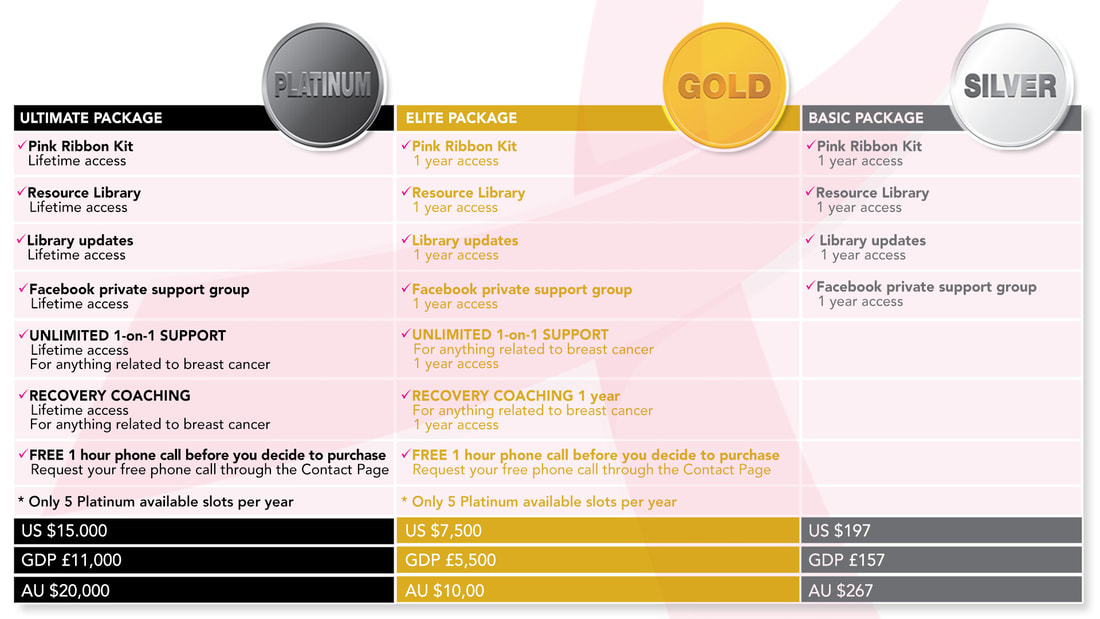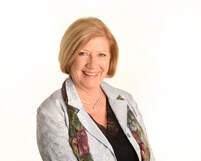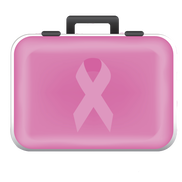Mastectomy patients need more
than just breast cancer surgery or medical treatments !
There are often significant emotional challenges with a breast cancer diagnosis and treatment journey for you... and those who love you. Just 'riding the storm' using will power and blind trust is not helpful for most people.
With the right information and appropriate support you will make it easier to travel through this challenge.
Your spouse, parents, friends, work colleagues and children need support too. The patient is asked how they are and given gifts and empathy, but
your inner circle of people can often suffer too. Sometimes they feel 'side-lined' and if the treatments go on for months, they can feel resentful of the attention always on the patient. That is especially true of the main carer and children.
Children need careful handling. What and when to tell them about your cancer is a common question.
With the right information and appropriate support you will make it easier to travel through this challenge.
Your spouse, parents, friends, work colleagues and children need support too. The patient is asked how they are and given gifts and empathy, but
your inner circle of people can often suffer too. Sometimes they feel 'side-lined' and if the treatments go on for months, they can feel resentful of the attention always on the patient. That is especially true of the main carer and children.
Children need careful handling. What and when to tell them about your cancer is a common question.
Your medical team is rightly focused on your treatments and often don’t have time to help you emotionally.
The don't have time to tell you what you need to know about making the best possible recovery...physically, emotionally and sexually!
However, research shows that how you cope with breast cancer is related to how well you are supported, (no matter how strong and independent you have been before cancer rudely showed up in your life)!
NBCC & NCCI, 2000
The don't have time to tell you what you need to know about making the best possible recovery...physically, emotionally and sexually!
However, research shows that how you cope with breast cancer is related to how well you are supported, (no matter how strong and independent you have been before cancer rudely showed up in your life)!
NBCC & NCCI, 2000
Have you experienced any of these emotions since your breast cancer diagnosis?
- Shock
- Panic
- Dread
- Fear
- Numbness
- Confusion
- Crying
- Anger
- Stress
- Bewilderment
- Hysterical laughter
- Insecurity
- Distress
- Depression
These are common emotions especially both at the start of your breast cancer journey and as treatments progress.
You can have several conflicting emotions in one 24 hour period... It's a bit of a roller coaster!
You can have several conflicting emotions in one 24 hour period... It's a bit of a roller coaster!
Research shows that almost everyone benefits from getting support and information.
Support is essential for every patient (and loved ones) because it helps improve the capacity for coping.(O’Reilly)
Let’s look at the stats for cancer patients during and after treatments:
66% experience long term psychological distress
35-45% report emotional distress
30% are anxious
20-30% diagnosed with depression
4% suffer PTSD (post traumatic stress disorder)
Does that sound a bit scary….and unexpected?
Ask yourself…
1. Will I choose to be a breast cancer victim, survivor or conqueror?
2. Am I willing to get the help my family and I need?
3. Do I sometimes feel like I am on a cancer conveyor belt that carries me along the medical system and
I really want them to switch it off and let ME have the control?
Support is essential for every patient (and loved ones) because it helps improve the capacity for coping.(O’Reilly)
Let’s look at the stats for cancer patients during and after treatments:
66% experience long term psychological distress
35-45% report emotional distress
30% are anxious
20-30% diagnosed with depression
4% suffer PTSD (post traumatic stress disorder)
Does that sound a bit scary….and unexpected?
Ask yourself…
1. Will I choose to be a breast cancer victim, survivor or conqueror?
2. Am I willing to get the help my family and I need?
3. Do I sometimes feel like I am on a cancer conveyor belt that carries me along the medical system and
I really want them to switch it off and let ME have the control?
You won’t be surprised to learn that scientific research and anecdotal stories from breast cancer patients and survivors tell us that ladies with a history of emotional, physical or sexual abuse, as a child or an adult, have a more difficult time coping with traumatic stress…in this case, breast cancer.
You may feel exposed when your breasts are examined, sometimes causing flashbacks to occur.
If that is you, we have special resources for you in the Resource Library, (part of the Pink Ribbon Kit).
This can become the season when you can walk through the healing process of past abuse.
You may feel exposed when your breasts are examined, sometimes causing flashbacks to occur.
If that is you, we have special resources for you in the Resource Library, (part of the Pink Ribbon Kit).
This can become the season when you can walk through the healing process of past abuse.
No longer is the focus on just getting breast cancer patients through to the end of their treatments.
Health professionals now realize that the cancer journey doesn’t end there.
Whatever stage you are with breast cancer, you and your loved ones have emotional needs that need to be acknowledged and addressed… not swept under the carpet until 'later'. ..or maybe never!
Research also shows that anxiety, depression, fatigue, aches and pains, lymphedema, emotional and sexual issues can cast a long shadow for years after treatments are over and you have been told to “go back to your life”.
Do NOT despair...the research and stats only alert us to the fact that to make you cancer journey more comfortable with a better recovery most ladies benefit by information and support.
Health professionals now realize that the cancer journey doesn’t end there.
Whatever stage you are with breast cancer, you and your loved ones have emotional needs that need to be acknowledged and addressed… not swept under the carpet until 'later'. ..or maybe never!
Research also shows that anxiety, depression, fatigue, aches and pains, lymphedema, emotional and sexual issues can cast a long shadow for years after treatments are over and you have been told to “go back to your life”.
Do NOT despair...the research and stats only alert us to the fact that to make you cancer journey more comfortable with a better recovery most ladies benefit by information and support.
Hi, I’m Trish Duke, a health professional who has been caring for ladies in your situation for over 40 years.
(About Trish page)
As a Physical therapist, my initial aim was to teach post-operative mastectomy patients how to recover physically:
Many of them opened up to me about their emotional (and sexual) issues along their cancer journey….and beyond… when they were supposed to be “back to normal”.
Ladies who did not have a good prognosis (expected outcome) needed a great deal more support, as you could imagine.
(About Trish page)
As a Physical therapist, my initial aim was to teach post-operative mastectomy patients how to recover physically:
- Restore arm/shoulder movement and function
- Treat any swelling around the surgical scars
- General fitness
Many of them opened up to me about their emotional (and sexual) issues along their cancer journey….and beyond… when they were supposed to be “back to normal”.
Ladies who did not have a good prognosis (expected outcome) needed a great deal more support, as you could imagine.
When you explore this website you will discover the PINK RIBBON KIT containing a multi media Resource Library with information and resources that help you to make the best recovery possible…spirit, soul and body. Some call that holistic care. Each part of us affects the other parts.
There is also private Facebook support group. This aims to support you for as long as you need us and give you access to an international community of ladies who "get" where you are. Most groups expect you leave after your treatment phase is over.
An option for personal one-on-one confidential support is available for 5 ladies per year.
If you choose the option of ‘one-on-one’, Trish Duke is your key support person and recovery coach who can communicate with you weekly
by email, WhatsApp, Skype, phone, Messenger etc.
Trish has been a qualified cancer support group facilitator for many years and treated breast cancer patients over four decades as a physiotherapist. (About)
This option has limited places to ensure adequate care and time for each person.
Applicants for 'one-on-one' support are accepted only after a chat with Trish to make sure that it's a right fit for you.
Contact Trish through the contact form to request a phone call to discuss the opportunity to take one of the five one-on-one slots available per year.
by email, WhatsApp, Skype, phone, Messenger etc.
Trish has been a qualified cancer support group facilitator for many years and treated breast cancer patients over four decades as a physiotherapist. (About)
This option has limited places to ensure adequate care and time for each person.
Applicants for 'one-on-one' support are accepted only after a chat with Trish to make sure that it's a right fit for you.
Contact Trish through the contact form to request a phone call to discuss the opportunity to take one of the five one-on-one slots available per year.
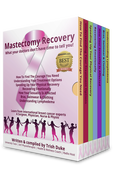
Let’s look at some of the resources in the package that are emotionally nourishing for you...
Resource #1
I wrote a series of 7 e-Books called “Mastectomy Recovery” (best sellers on Amazon.com).
One of the books is called “Recovering Emotionally After A Mastectomy” and includes:
*How emotions affect the recovery process
*Stress and pain management
*Processing thoughts & emotions with a journal
*Humour therapy
*Meaningful touch
*Sense soothers
*Massage & Aromatherapy
*How Music helps
*Having fun
Resource # 2
Dying To Live” is an award winning documentary series with 3 one hour programs.
Episode #3, “A family Affair” visits a mother and daughter who both battled breast cancer and won!
The mom and dad talk about their journey and how they later set up a cancer support group. Sonia, the daughter was going through treatment at the time of filming, but is now through all that and studying psychology.
She and her husband Cliff share their journeys and what they told their children.
Woven into the three programs are psycho-social-spiritual solutions to common challenges seen in patients and families who are battling any cancer diagnosis.
As the series unfolds you will be able to relate to the families who openly sharing their struggles and deeply poignant moments.
You might say “That sounds like my family” or “We went through a similar time ourselves”.
Honest and intimate footage brings us into their hearts as they openly share how they faced the rollercoaster ride from diagnosis through the progression of their life-limiting disease to recovery or death.
They talk about common fears and struggles, how they coped…...or didn’t, thoughts of suicide, funerals, reactions of friends and family….and much more.
Resource # 3
Sonia Gives an Exclusive Radio Interview
An honest and open radio interview with Sonia two years after her bilateral mastectomy.
Sonia talks about her journey and how writing a journal helps her enormously.
Resource # 4 PDF
How Writing A Journal Can Greatly Help Your Emotional Recovery
Learn why people who write a journal are usually very clear that it has been a vital part of their inner life.
Three short pages of wisdom that you can use for the rest of your life!
Resource # 5
Rest & Restore MP3
- Rest your body and mind.
- Restore peace and energy
- Simple relaxation techniques and meditations
- Easy relaxation
- Meditations to comfort and inspire you from the Bible
- A healing song
Resource # 6
“Karen’s Story” Radio interview
Another exclusive and intimate radio interview, this time with Karen, a breast cancer survivor 7 years down the track.
What worked for her could work for you!
Resource # 7
#METOO ladies
Do you function and look great on the outside, but struggle with submerged wounds?
1 in 4 ladies have been sexually abused in their life and untold numbers have been emotionally and physically abused … sometimes a combination of all three types of abuse. Sadly, often by people they should have been able to trust.
It’s never your fault … no matter what your abusers told you.
Being touched or exposed during medical examinations or treatments can trigger painful memories, increase fear or even flashbacks of past abuse.
It may be hard to you to trust people, even the medical team who are doing their best for you. That can make your breast cancer journey more disturbing.
With the global #METOO publicity, the medical world is beginning to waken up to how their intimate treatments can unwittingly distress their patients.
Usually, they don’t know what to do or say to help you, so the issues are not addressed. As well as breast cancer, this could include pap smears, pregnancy and childbirth, gynaecological conditions, mammograms, mole scans, etc. Even dentists report that some patients are frighted of having someone near their neck or mouth because of past abuse.
Clearly, this is a huge issue that the medical world needs to recognise, address and refer patients to helpful organisations or just understanding,
empathetic people.
What is reported from abused people of all ages and backgrounds, is that being able to tell your story to someone who really listens and believes you has an immensely positive effect. It’s a story that may have been your deep and painful secret for decades. Sharing that secret can be like lancing a boil and letting
all the puss out. Such a relief! You don’t need to tell all the private details … unless you really feel the need to.
In the Mastectomy Recovery Centre we believe that only God can FULLY heal your soul and set you free of the damage others have inflicted on you.
During your breast cancer journey could be the perfect time to discover the steps to find release and healing from that deep wounding.
Imagine the difference that could make to your emotional and physical health as well as with close relationships…
Step # 1
Accept that you have been abused.
Step # 2
Decide that you would like to be free of the secret pain and effects of your abuse.
Step # 3
We encourage you to take the first step of hearing how people who had similar stories to you and already come through that secret tunnel to freedom.
Step # 4
Find someone who understands your pain and can listen to your story, then walk beside you out of your secret pain into what can feel like a new life.
In the Resource Library there are some videos with ladies sharing their stories of abuse... and how they stepped in freedom.
They will help you to address and find complete healing from your past abuse … any type of abuse and at any age.
It will make your breast cancer journey less stressful.
#METOO ladies
Do you function and look great on the outside, but struggle with submerged wounds?
1 in 4 ladies have been sexually abused in their life and untold numbers have been emotionally and physically abused … sometimes a combination of all three types of abuse. Sadly, often by people they should have been able to trust.
It’s never your fault … no matter what your abusers told you.
Being touched or exposed during medical examinations or treatments can trigger painful memories, increase fear or even flashbacks of past abuse.
It may be hard to you to trust people, even the medical team who are doing their best for you. That can make your breast cancer journey more disturbing.
With the global #METOO publicity, the medical world is beginning to waken up to how their intimate treatments can unwittingly distress their patients.
Usually, they don’t know what to do or say to help you, so the issues are not addressed. As well as breast cancer, this could include pap smears, pregnancy and childbirth, gynaecological conditions, mammograms, mole scans, etc. Even dentists report that some patients are frighted of having someone near their neck or mouth because of past abuse.
Clearly, this is a huge issue that the medical world needs to recognise, address and refer patients to helpful organisations or just understanding,
empathetic people.
What is reported from abused people of all ages and backgrounds, is that being able to tell your story to someone who really listens and believes you has an immensely positive effect. It’s a story that may have been your deep and painful secret for decades. Sharing that secret can be like lancing a boil and letting
all the puss out. Such a relief! You don’t need to tell all the private details … unless you really feel the need to.
In the Mastectomy Recovery Centre we believe that only God can FULLY heal your soul and set you free of the damage others have inflicted on you.
During your breast cancer journey could be the perfect time to discover the steps to find release and healing from that deep wounding.
Imagine the difference that could make to your emotional and physical health as well as with close relationships…
Step # 1
Accept that you have been abused.
Step # 2
Decide that you would like to be free of the secret pain and effects of your abuse.
Step # 3
We encourage you to take the first step of hearing how people who had similar stories to you and already come through that secret tunnel to freedom.
Step # 4
Find someone who understands your pain and can listen to your story, then walk beside you out of your secret pain into what can feel like a new life.
In the Resource Library there are some videos with ladies sharing their stories of abuse... and how they stepped in freedom.
They will help you to address and find complete healing from your past abuse … any type of abuse and at any age.
It will make your breast cancer journey less stressful.

Please don’t struggle on your own!
We like to think that we are as strong as men, and we often are in many ways, but emotionally women were never designed to cope alone with huge challenges. (Woman libbers can lynch me later!)
As we can see from research, you will be doing yourself a favour in getting what help you need.
Why travel on your cancer journey in 'economy ' if you can fly ' first class'?
The Pink Ribbon kit
Click here to access the Resource Centre 24/7 and Facebook support group for your lifetime
Remember...this is not the time to “go it alone”.


